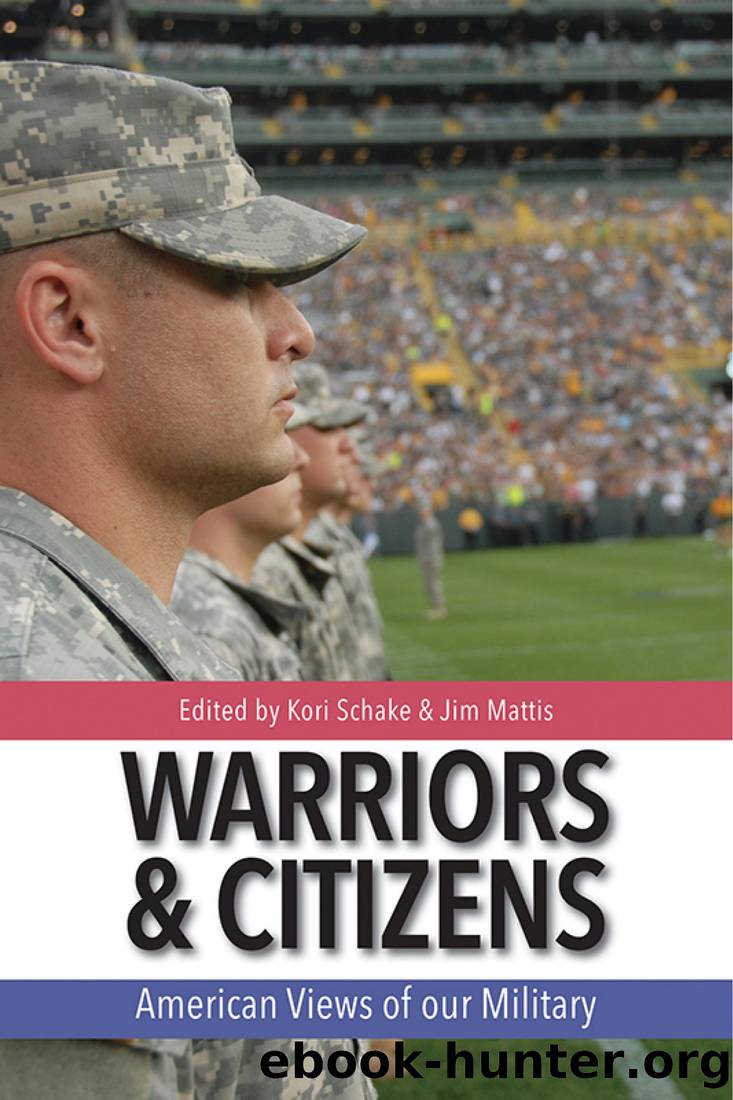Warriors and Citizens: American Views of Our Military by Kori Schake & Jim Mattis

Author:Kori Schake & Jim Mattis [Schake, Kori & Mattis, Jim]
Language: eng
Format: epub
Tags: History, Military, Non-Fiction, Political Science, United States
ISBN: 9780817919368
Google: 1gpmDAAAQBAJ
Publisher: Hoover Press
Published: 2016-07-31T23:00:00+00:00
CHAPTER 7
Testing the
“Flournoy Hypothesis”
Civil-Military Relations in the Post-9/11 Era
Thomas Donnelly
“It’s an Eliot Cohen world.” Thus spake Michele Flournoy, former undersecretary of defense for policy, possibly a future secretary of defense, and certainly a leading-edge indicator of attitudes among the Washington smart set on matters of military affairs, at a recent conference on the future of war.[1] While her precise meaning was cryptic, the context was the topic of civil-military relations. What Flournoy meant was that she had accepted the argument advanced in Cohen’s Supreme Command,[2] the most widely read if not necessarily the most widely understood book on the subject in the last generation, that soldiers and statesmen in wartime engage in an “unequal dialogue” wherein civilians must strive to give due consideration to commanders’ best military judgments but retain the power and responsibility of decision making. Let’s call this, for the purposes of this essay, the Flournoy Hypothesis.
But is it, indeed, an “Eliot Cohen world”? Do American presidents and their advisers in fact attempt to engage in this kind of unequal dialogue or otherwise emulate the models of wartime leadership—Abraham Lincoln, Winston Churchill, Georges Clemenceau, and David Ben-Gurion—sketched in Supreme Command? And, perhaps even more critically given the United States’ role as guarantor of a system of international security, does this unequal dialogue continue in peacetime or in the formulation of broader defense policy? Finally, can one see a reflection of the Flournoy Hypothesis at work in public opinion polls or when the US Congress performs a subordinate but critical role in the raising and regulating of the American military?
This essay will argue that, although advanced thinkers such as Flournoy have sworn bay’ah to the need for energetic civilian oversight of military affairs, in behavior the US defense establishment is a creature in a Samuel Huntington world, meaning that it endorses a rigid distinction between military and civilian spheres of competence and, frequently, a de facto embrace of “objective control”—Huntington’s model for achieving civilian supremacy while granting a special status to military “professionals.” The argument will begin by placing Cohen within the context of the civil-military debate of the post-cold-war era, a debate shaped largely by critiques of Huntington. A second section will present a brief summary of the wartime actions of the Bush and Obama administrations, suggesting that, with the exception of the last two years of the Bush administration and the attempt to implement the Iraq “surge,” the pattern of behavior has been more Huntingtonian than Cohenian. A third section will consider the actions of Congress and attitudes of the public to claim that the world of American civil-military relations is actually becoming increasingly Huntingtonian. This is particularly so when the broader range of defense issues is taken into account and most especially when one looks closely at the issue of post-traumatic stress disorder (PTSD); the oft-observed civil-military gap may not merely be “professionalized” but increasingly medicalized. Lastly, the essay will conclude with a reflection on the work of Morris Janowitz, the sociologist whose observations about the
Download
This site does not store any files on its server. We only index and link to content provided by other sites. Please contact the content providers to delete copyright contents if any and email us, we'll remove relevant links or contents immediately.
The Secret History by Donna Tartt(16608)
The Social Justice Warrior Handbook by Lisa De Pasquale(11485)
Thirteen Reasons Why by Jay Asher(7782)
This Is How You Lose Her by Junot Diaz(5753)
Weapons of Math Destruction by Cathy O'Neil(5029)
Zero to One by Peter Thiel(4817)
The Myth of the Strong Leader by Archie Brown(4785)
Promise Me, Dad by Joe Biden(4440)
Stone's Rules by Roger Stone(4412)
Beartown by Fredrik Backman(4404)
How Democracies Die by Steven Levitsky & Daniel Ziblatt(4392)
The Fire Next Time by James Baldwin(4336)
100 Deadly Skills by Clint Emerson(4070)
A Higher Loyalty: Truth, Lies, and Leadership by James Comey(4024)
Rise and Kill First by Ronen Bergman(4008)
The David Icke Guide to the Global Conspiracy (and how to end it) by David Icke(3875)
The Farm by Tom Rob Smith(3869)
Secrecy World by Jake Bernstein(3773)
The Doomsday Machine by Daniel Ellsberg(3725)
